Here are my favorite most marvelous poems about machines categorized:
- Short poems about machines
- Poems about simple machines
- Poems about machines and technology
So if you want the best poems about machines, then you’re in the right place.
Let’s get started!

Marvelous Poems About Machines
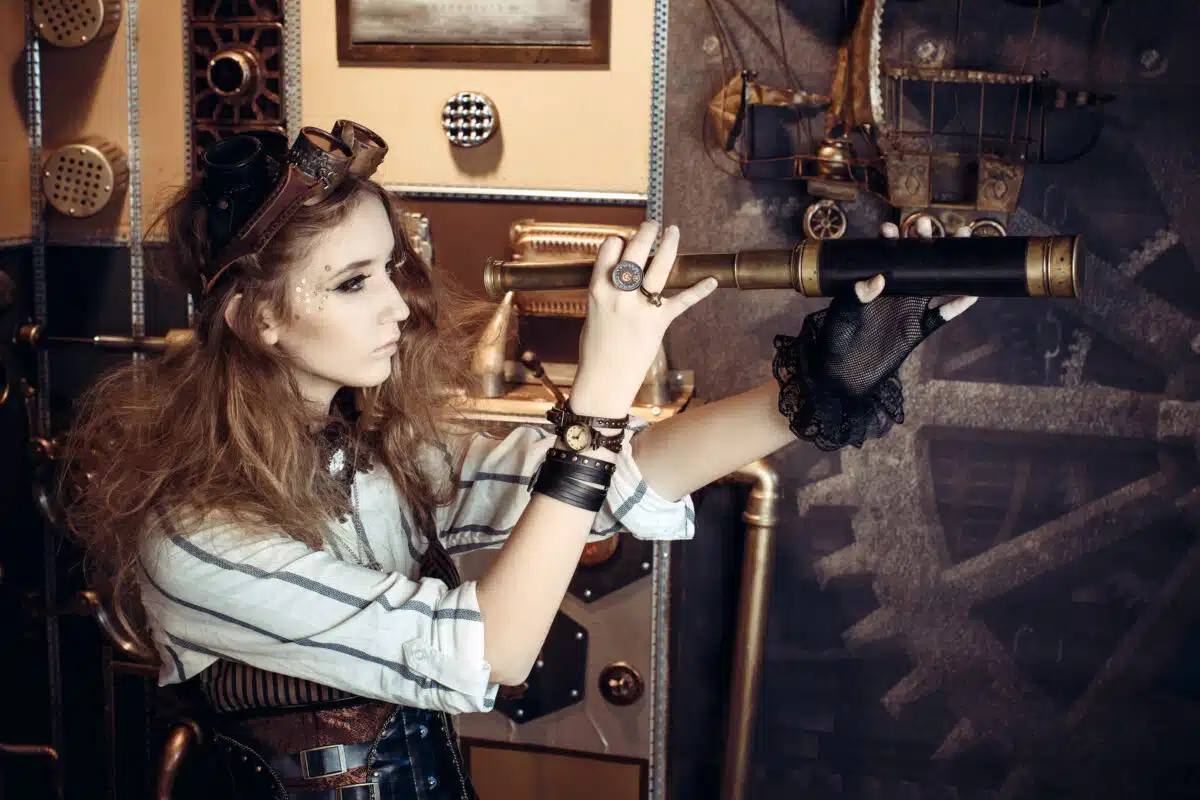
Experience a magnificent world where machines and the beauty of words dances harmoniously with the mechanical wonders of our modern age.
In this marvelous collection of poems, you will embark on a captivating journey through the realm of machines, where poets have skillfully crafted verses that celebrate and explore the intricate relationship between humans and technology.
We will take you on a trip through throbbing engine rooms, smoky railway stations, and nostalgic workshop sheds of village smiths.
Each poem is a magical tale that describes the evolution of machines throughout the history of humankind, offering a unique glimpse into the soul of machines.
So, fasten your seatbelt and allow these adventurous verses to transport you to a world where the mechanical meets the poetic in perfect harmony.
Let’s jump right in!
My #1 Favorite Poem About Machines
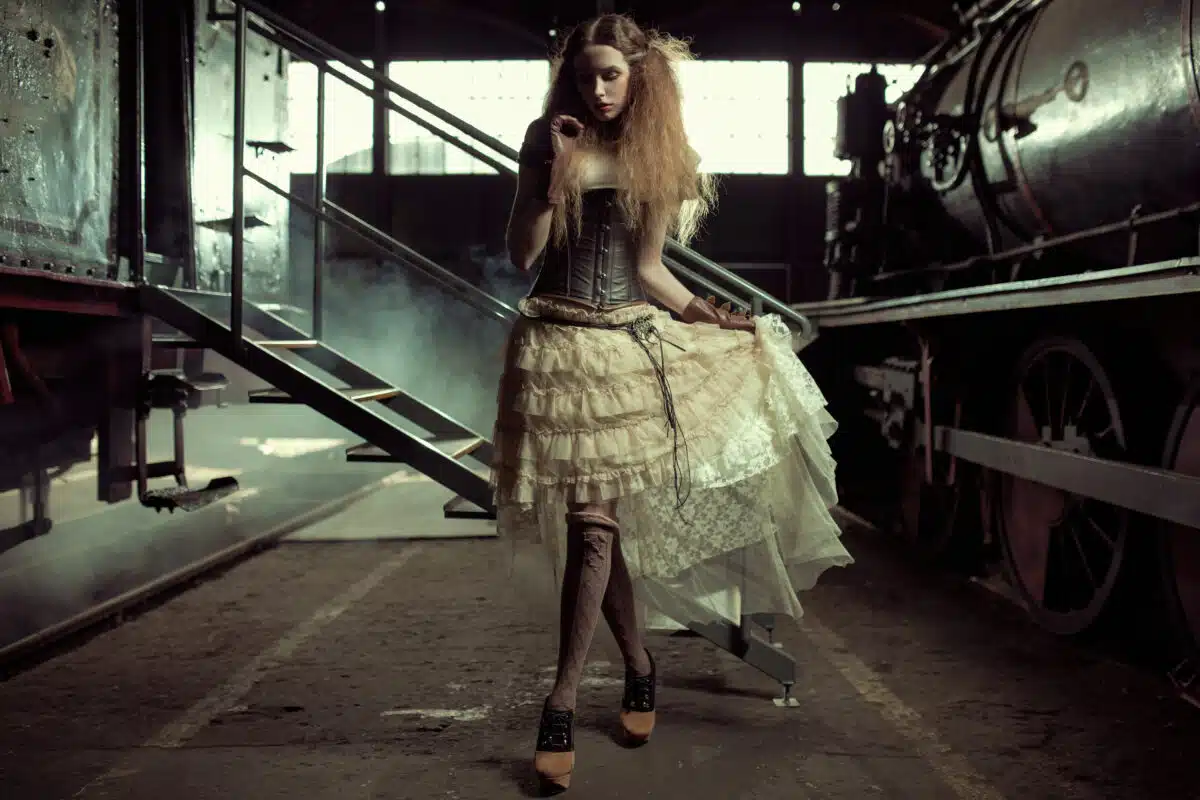
“To a Locomotive in Winter” by Walt Whitman
Thee for my recitative,
Thee in the driving storm even as now, the snow, the winter-day declining,
Thee in thy panoply, thy measur’d dual throbbing and thy beat convulsive,
Thy black cylindric body, golden brass, and silvery steel,
Thy ponderous side-bars, parallel and connecting rods, gyrating, shuttling at thy sides,
Thy metrical, now swelling pant and roar, now tapering in the distance,
Thy great protruding head-light fix’d in front,
Thy long, pale, floating vapor-pennants, tinged with delicate purple,
The dense and murky clouds out-belching from thy smoke-stack,
Thy knitted frame, thy springs and valves, the tremulous twinkle of thy wheels,
Thy train of cars behind, obedient, merrily following,
Through gale or calm, now swift, now slack, yet steadily careering;
Type of the modern—emblem of motion and power—pulse of the continent,
For once come serve the Muse and merge in verse, even as here I see thee,
With storm and buffeting gusts of wind and falling snow,
By day thy warning ringing bell to sound its notes,
By night thy silent signal lamps to swing.
Fierce-throated beauty!
Roll through my chant with all thy lawless music, thy swinging lamps at night,
Thy madly-whistled laughter, echoing, rumbling like an earthquake, rousing all,
Law of thyself complete, thine own track firmly holding,
(No sweetness debonair of tearful harp or glib piano thine,)
Thy trills of shrieks by rocks and hills return’d,
Launch’d o’er the prairies wide, across the lakes,
To the free skies unpent and glad and strong.
Why “To a Locomotive in Winter” Is My Favorite Poem
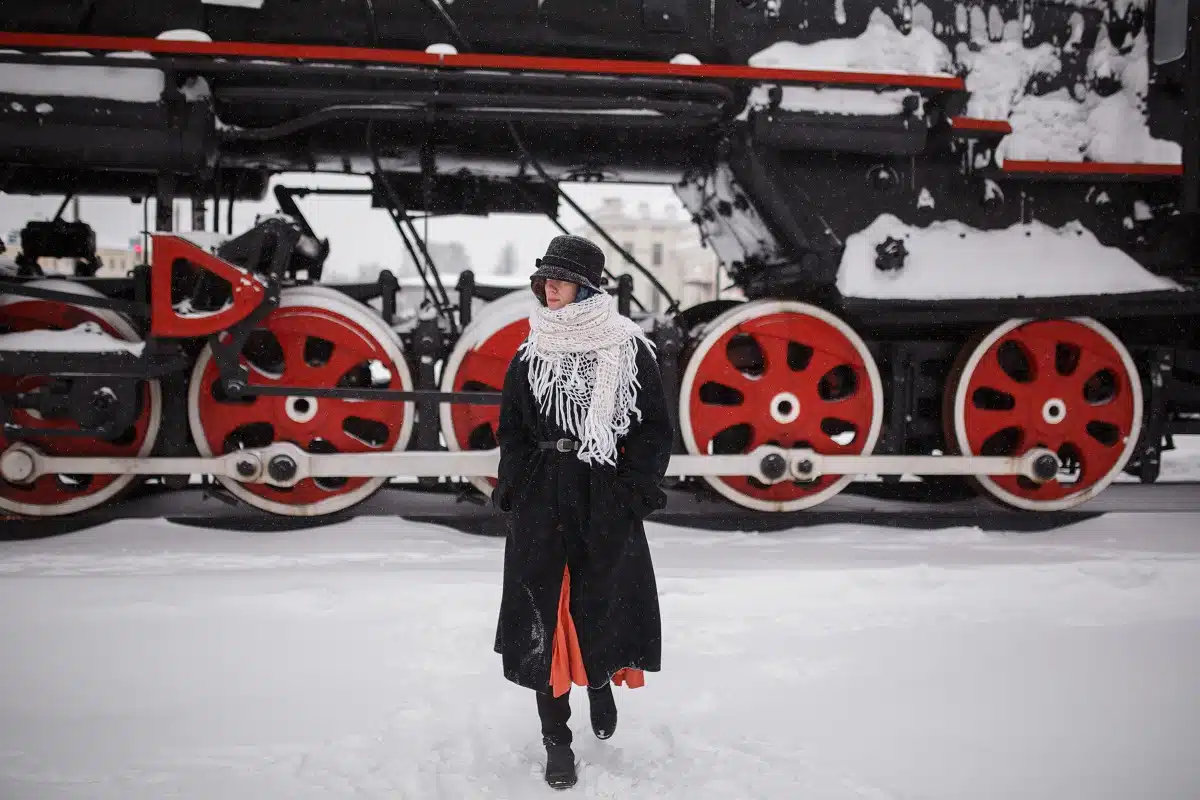
The poem “To a Locomotive in Winter” is an excellent example of a writer’s skillful use of descriptive imagery, metaphors, and personification in poetry.
For people like me who are not mechanically inclined, Whitman allows me to appreciate and see trains from a different perspective through vivid and detailed descriptions of this “fierce-throated beauty.”
I appreciate how Whitman presents the train as a tangible symbol of technological progress in his native America, which also reflects his deep love and patriotism for his beloved country.
His powerful use of descriptive language transports me to the scene, where I can feel the cold air and hear the thunderous sound of the locomotive.
Overall, this piece celebrates progress and industrialization, speaking to me on both an emotional and intellectual level, making it a personal favorite.
Short Poems About Machines
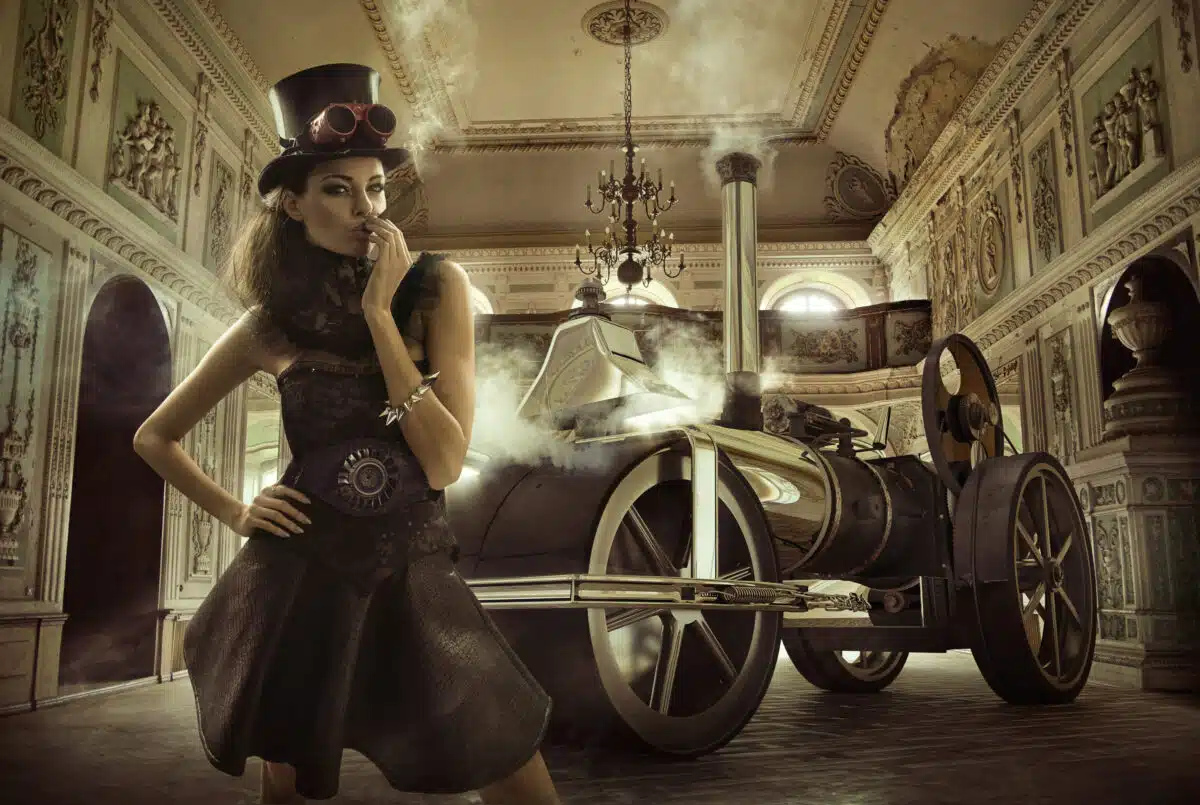
Explore the intriguing relationship between man and machine with charm and eloquence through these machine-inspired short poems.
View machines from a unique perspective and uncover the hidden symbolism that our beloved poets wish to convey today and for future generations.
Let’s go!

“No Labor-Saving Machine” by Walt Whitman
No labor-saving machine,
Nor discovery have I made,
Nor will I be able to leave behind me any wealthy bequest to found
hospital or library,
Nor reminiscence of any deed of courage for America,
Nor literary success nor intellect; nor book for the book-shelf,
But a few carols vibrating through the air I leave,
For comrades and lovers.
“I Was Looking a Long While” by Walt Whitman
I was looking a long while for Intentions,
For a clew to the history of the past for myself, and for these
chants—and now I have found it,
It is not in those paged fables in the libraries, (them I neither
accept nor reject,)
It is no more in the legends than in all else,
It is in the present—it is this earth to-day,
It is in Democracy—(the purport and aim of all the past,)
It is the life of one man or one woman to-day—the average man of to-day,
It is in languages, social customs, literatures, arts,
It is in the broad show of artificial things, ships, machinery,
politics, creeds, modern improvements, and the interchange of nations,
All for the modern—all for the average man of to-day.
“La Mer” by Oscar Wilde
A white mist drifts across the shrouds,
A wild moon in this wintry sky
Gleams like an angry lion’s eye
Out of a mane of tawny clouds.
The muffled steersman at the wheel
Is but a shadow in the gloom;—
And in the throbbing engine-room
Leap the long rods of polished steel.
The shattered storm has left its trace
Upon this huge and heaving dome,
For the thin threads of yellow foam
Float on the waves like ravelled lace.
Poems About Simple Machines
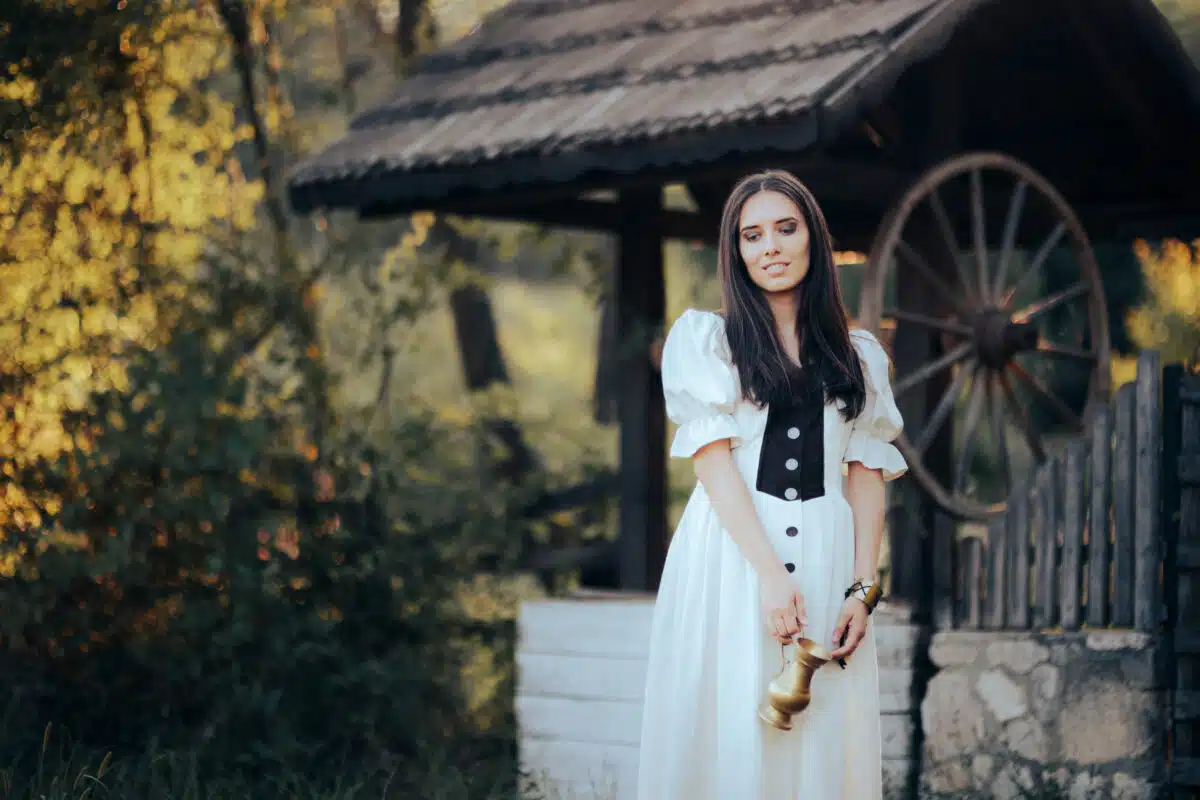
Discover the beauty and wonder of everyday objects as they come alive through the power of words, capturing the essence of their functionality and the marvel they bring to our lives.
Get ready to be awestruck by these tasteful pieces dedicated to simple machines.
Keep reading!

“To—” by S. Conant Foster
On the road to Pansy Villa
As I on my cycle roam,
How do I know Polly Miller,
Pretty Polly, is at home?
If a ribbon decks her curtain—
Keep our secret, I implore—
Then my wheel is pretty certain
To be seen at Polly’s door.
“Wheel Bliss” by S. Conant Foster
Every morning as I spin
On my wheel for exercise,
Such a pretty glance I win
From a pair of pretty eyes,
From a maiden full of mirth,
Bearing on her curly head
Jug of milk, a penny- worth,
And a two-pence-worth of bread.
Poor the lassie is, I know,
Yet contented with her lot:
In her tidy calico,
As she saunters to her cot,
She is queen of all the earth,
And the crown upon her head
Is the milk, a penny- worth,
And the two-pence- worth of bread.
Maiden, will you marry me?
O’er the rugged road of life
I could wheel right merrily
With so sweet a little wife;
Do! I’ll dress you up in silk,
And I’ll go myself, instead,
For the penny-worth of milk,
And the two-pence-worth of bread.
Every morning as I ride
Ah, what blessed paradise!
Nestling closely to my side.
Sits my wife with pretty eyes;
Laughing, talking, full of mirth,
As we swiftly forge ahead
For the milk, a two-pence-worth,
And a four- pence-worth of bread.
“Bessy and Her Spinning-Wheel” by Robert Burns
O leeze me on my spinning-wheel,
O, leeze me on my rock and reel;
Frae tap to tae that cleeds me bien,
And haps me fiel and warm at e’en!
I’ll set me down and sing and spin,
While laigh descends the simmer sun,
Blest wi’ content, and milk and meal
O, leeze me on my spinning-wheel!
On ilka hand the burnies trot,
And meet below my theekit cot;
The scented birk and hawthorn white
Across the pool their arms unite,
Alike to screen the birdie’s nest,
And little fishes’ caller rest;
The sun blinks kindly in the biel’,
Where blithe I turn my spinning-wheel.
On lofty aiks the cushats wail,
And echo cons the doolfu’ tale;
The lintwhites in the hazel-braes,
Delighted, rival ither’s lays:
The craik amang the clover hay,
The paitrick whirrin’ o’er the ley,
The swallow jinkin’ round my shiel,
Amuse me at my spinning-wheel .
Wi’ sma’ to sell, and less to buy,
Aboon distress, below envy;
O, wha wad leave this humble state
For a’ the pride of a’ the great?
Amid their flaring, idle toys,
Amid their cumbrous, dinsome joys,
Can they the peace and pleasure feel
Of Bessy at her spinning-wheel?
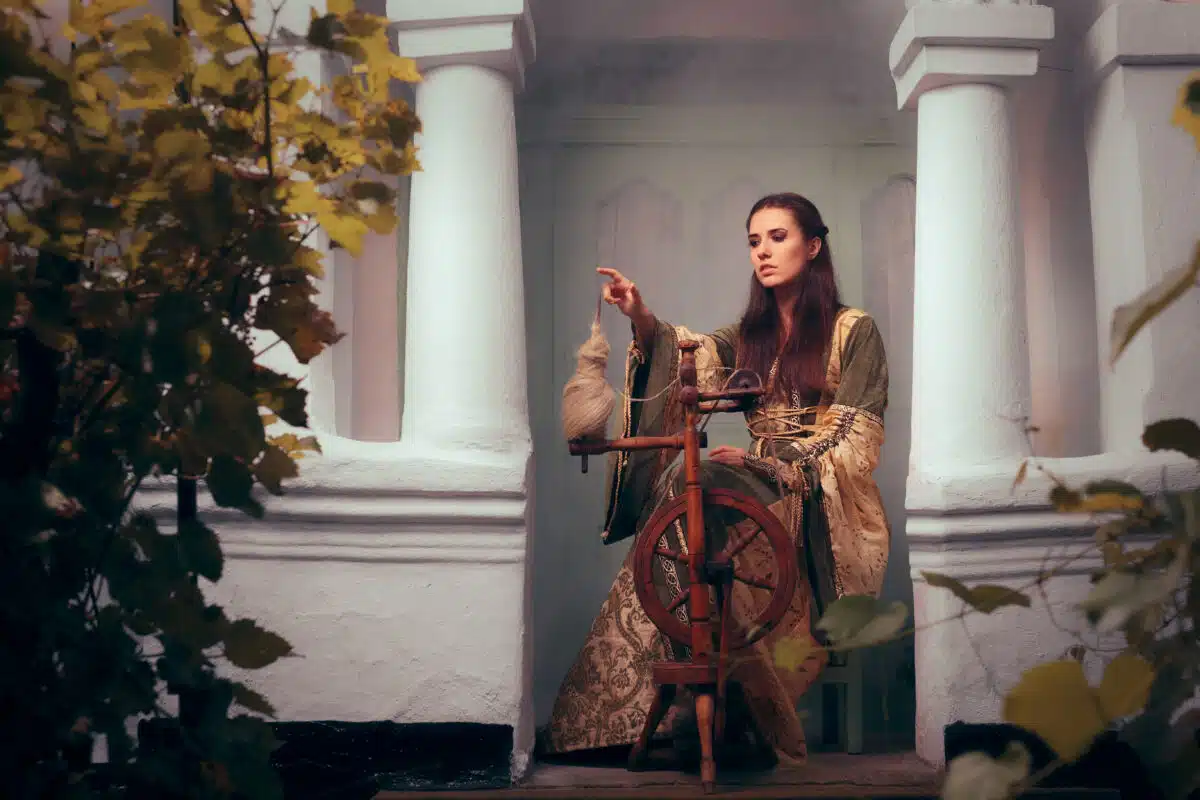
“From Dawn to Dawn” by Morris Rosenfeld
I bend o’er the wheel at my sewing;
I’m spent; and I’m hungry for rest;
No curse on the master bestowing,—
No hell-fires within me are glowing,—
Tho’ pain flares its fires in my breast.
I mar the new cloth with my weeping,
And struggle to hold back the tears;
A fever comes over me, sweeping
My veins; and all through me goes creeping
A host of black terrors and fears.
The wounds of the old years ache newly;
The gloom of the shop hems me in;
But six o’clock signals come duly:
O, freedom seems mine again, truly…
Unhindered I haste from the din.
“Discharged” by William Ernest Henley
Carry me out
Into the wind and the sunshine,
Into the beautiful world.
O, the wonder, the spell of the streets!
The stature and strength of the horses,
The rustle and echo of footfalls,
The flat roar and rattle of wheels!
A swift tram floats huge on us
It’s a dream?
The smell of the mud in my nostrils
Blows brave—like a breath ofthe sea!
As of old,
Ambulant, undulant drapery,
Vaguely and strangely provocative,
Flutters and beckons. O, yonder
Is it ?—the gleam of a stocking!
Sudden, a spire
Wedged in the mist! O, the houses,
The long lines of lofty, grey houses,
Cross-hatched with shadow and light!
These are the streets.
Each is an avenue leading
Whither I will!
Free …!
Dizzy, hysterical, faint,
I sit, and the carriage rolls on with me
Into the wonderful world.
“Ballade Made In The Hot Weather” by William Ernest Henley
Fountains that frisk and sprinkle
The moss they overspill;
Pools that the breezes crinkle;
The wheel beside the mill,
With its wet, weedy frill;
Wind-shadows in the wheat;
A water-cart in the street;
The fringe of foam that girds
An islet’s ferneries;
A green sky’s minor thirds—
To live, I think of these !
Of ice and glass the tinkle,
Pellucid, silver-shrill;
Peaches without a wrinkle;
Cherries and snow at will,
From china bowls that fill
The senses with a sweet
Incuriousness of heat;
A melon’s dripping sherds;
Cream-clotted strawberries;
Dusk dairies set with curds—
To live, I think of these !
Vale-lily and periwinkle;
Wet stone-crop on the sill;
The look of leaves a-twinkle
With windlets clear and still;
The feel of a forest rill
That wimples fresh and fleet
About one’s naked feet;
The muzzles of drinking herds;
Lush flags and bulrushes;
The chirp of rain-bound birds—
To live, I think of these!
Envoy
Dark aisles, new packs of cards,
Mermaidens’ tails, cool swards,
Dawn dews and starlit seas,
White marbles, whiter words—
To live, I think of these!
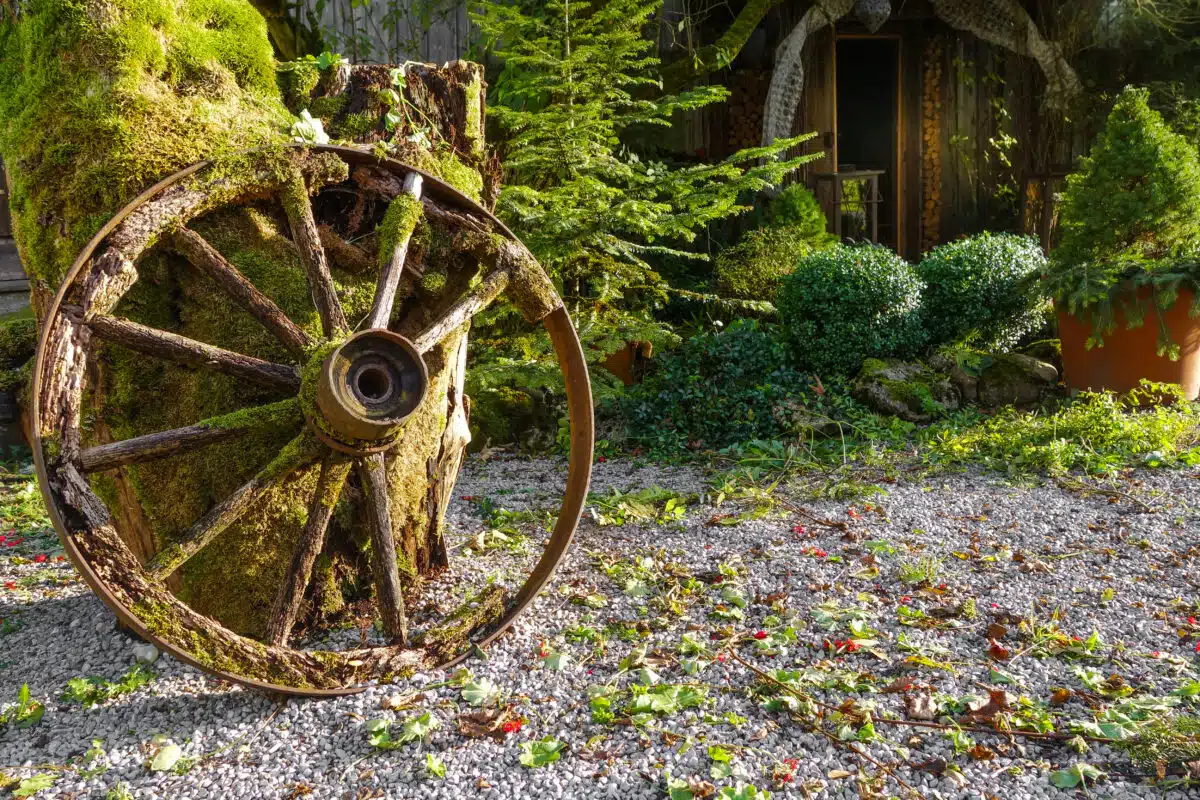
“Two Realities” by Aldous Huxley
A waggon passed with scarlet wheels
And a yellow body, shining new.
“Splendid!” said I. “How fine it feels
To be alive, when beauty peels
The grimy husk from life.” And you
Said, “Splendid!” and I thought you’d seen
That waggon blazing down the street;
But I looked and saw that your gaze had been
On a child that was kicking an obscene
Brown ordure with his feet.
Our souls are elephants, thought I,
Remote behind a prisoning grill,
With trunks thrust out to peer and pry
And pounce upon reality;
And each at his own sweet will
Seizes the bun that he likes best
And passes over all the rest.
“The Wheel of the Breast” by Ella Wheeler Wilcox
Through rivers of veins on the nameless quest
The tide of my life goes hurriedly sweeping,
Till it reaches that curious wheel o’ the breast,
The human heart, which is never at rest.
Faster, faster, it cries, and leaping,
Plunging, dashing, speeding away,
The wheel and the river work night and day.
I know not wherefore, I know not whither,
This strange tide rushes with such mad force:
It glides on hither, it slides on thither,
Over and over the selfsame course,
With never an outlet and never a source;
And it lashes itself to the heat of passion
And whirls the heart in a mill-wheel fashion.
I can hear in the hush of the still, still night,
The ceaseless sound of that mighty river;
I can hear it gushing, gurgling, rushing,
With a wild, delirious, strange delight,
And a conscious pride in its sense of might,
As it hurries and worries my heart forever.
And I wonder oft as I lie awake,
And list to the river that seethes and surges
Over the wheel that it chides and urges—
I wonder oft if that wheel will break
With the mighty pressure it bears, some day,
Or slowly and wearily wear away.
For little by little the heart is wearing,
Like the wheel of the mill, as the tide goes tearing
And plunging hurriedly through my breast,
In a network of veins on a nameless quest,
From and forth, unto unknown oceans,
Bringing its cargoes of fierce emotions,
With never a pause or an hour for rest.
Poems About Machines and Technology

Get ready for an adventure and delve into a world where words merge with wires and circuits, and emotions collide with the realm of machines and technology.
Discover the beauty and intricacy of our modern era as poets express their awe, fears, and hopes through verses that dance to the rhythm of innovation.
Let’s get into it!
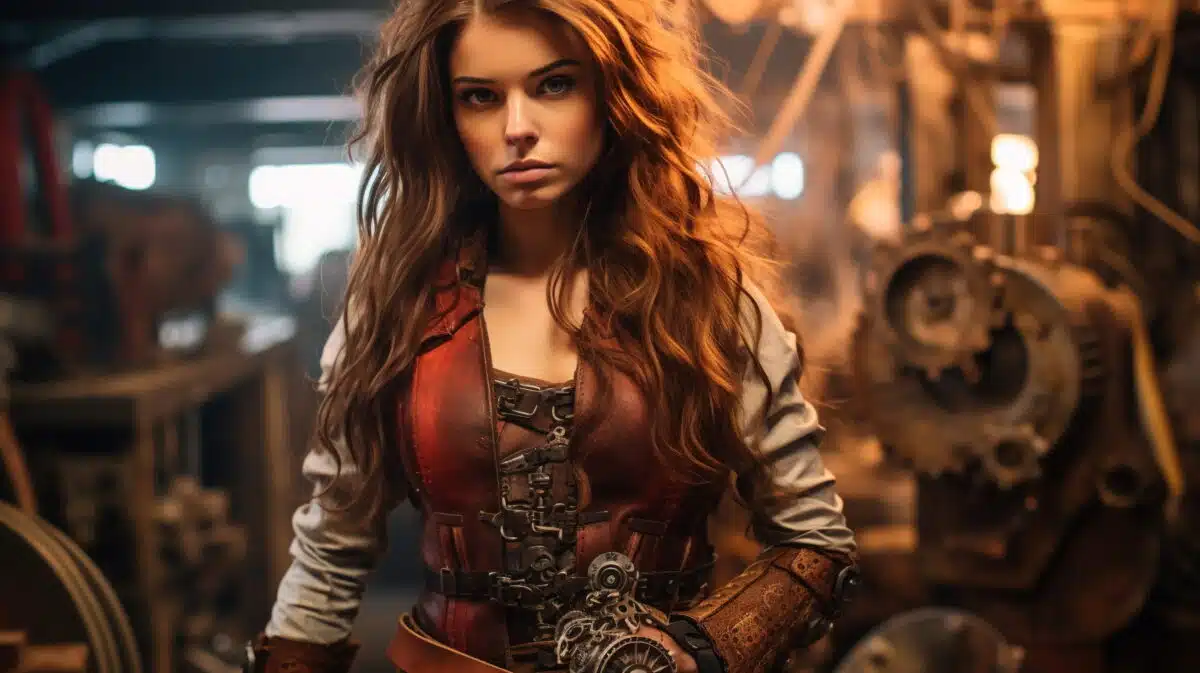
“Ennui” by Luis G. Dato
I slept in the frenzy
And delirium of men and their cities.
Close by the streets and the cross-ways of traffic,
Deep in the waste of houses
Where multitudes unsmiling are homeless,
Mouldered the hut of my life, care-deserted,
Of a haven of slumber and open-eyed sleep,
Of peace for my soul.
To the world and its whirling of men in disorder,
To the riot of manifold unvaried activities
From the pain of birth to the pleasure of death.
I lived not,
I slept for the peace of my soul.
Ears I had but I heard not
The clamor of bells from churches and towers of stone,
I heard not the clink of metal,
The groaning of iron
With the weight of passengers and wheels of iron,
The whistle from long-throated chimneys,
The siren of sound and smoke from the piers.
To the clanking of steel,
To the hissing of vapor from pent-up boilers
In the shops on the street, in the ships on the stream,
To the thud of machines against factory walls,
And of trucks on the adamant road in the open,
To the motley news-boys shrieking,
And the rabble of crowds on the street, on the square,
In a rush of commotion and fury
To the sounds, discordant, erratic, out of tune,
Cadenceless, out of time,
I was rock, unresponsive, alien, remote,
They were silence
And echoes sepulchral of silence in tombs.
Life that stirred from the vitals of creatures
Howling and wakeful in graves . . . .
Death that returned with the ebb and recession
Of life-refusing love
These to me meant nothing, when confusion was all they could mean.
Love that was hatred merely,
Hatred begotten of love unrequited,
Pity self-seeking, self-centered, selfish,
Friendship of hearts that were hollow of feeling,
Passions let loose
And cravings run wild,
These were the forces of fire and power titanic
Oppressing the flesh of a spirit rebellious
For freedom of pleasure,
For freedom from pain.
I slept forgetful of self,
Unconcerned about others living for their own
In a half-mad world.
Of desire unmindful,
Forgetting care and canker and chaos,
I slept with Endymion, loved of the moon, perpetual,
In the wilderness of cities,
In the wasteland of war.
“The Threshing Machine” by Alice Meynell
No “fan is in his hand” for these
Young villagers beneath the trees,
Watching the wheels. But I recall
The rhythm of rods that rise and fall,
Purging the harvest, over-seas.
No fan, no flail, no threshing-floor!
And all their symbols evermore
Forgone in England now—the sign,
The visible pledge, the threat divine,
The chaff dispersed, the wheat in store.
The unbreathing engine marks no tune,
Steady at sunrise, steady at noon,
Inhuman, perfect, saving time,
And saving measure, and saving rhyme—
And did our Ruskin speak too soon?
“No noble strength on earth” he sees
“Save Hercules’ arm”; his grave decrees
Curse wheel and steam. As the wheels ran
I saw the other strength of man,
I knew the brain of Hercules.
“To Edison” by Domingo de Vivero (Agnes Blake Poor, Translator)
In thee, the spirit of thy native soil
Draws breath and stirs with potent fruitful life.
Thou, from the field of elemental strife,
Seizest the guerdon of thy noble toil.
Franklin before, along the slender coil
Called down the fiery sparks in heaven rife.
Traced the quick ray, like sharp dividing knife;
And to the earth brought down the lightning’s spoil.
And thou, the living glory of thy race,
Preservest for all time the spoken word;
Defying ignorance’s numbing trace;
Despising falsehood’s deadly withering breath.
The immortal tree of life thy hand conferred,
Even on the edge of the abyss of death.
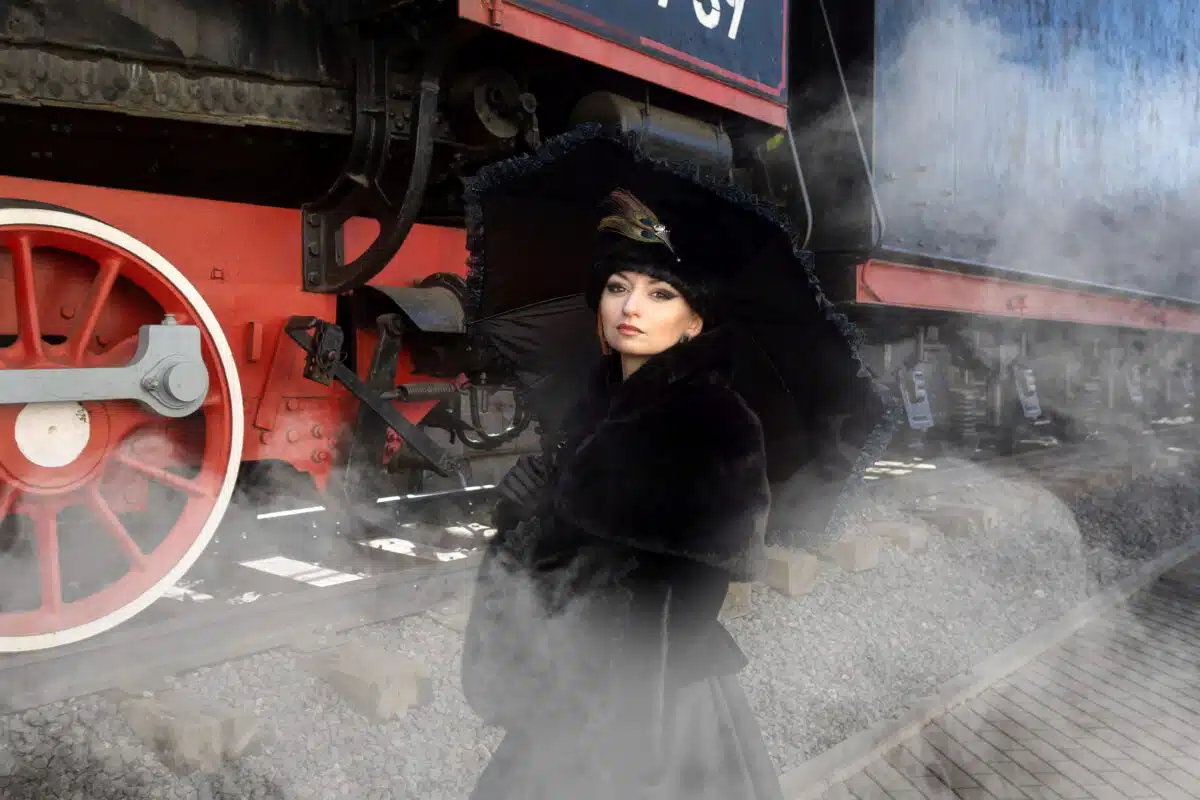
“The Engine” by Ella Wheeler Wilcox
Into the gloom of the deep, dark night,
With panting breath and a startled scream;
Swift as a bird in sudden flight
Darts this creature of steel and steam.
Awful dangers are lurking nigh,
Rocks and chasms are near the track,
But straight by the light of its great white eye
It speeds through the shadows, dense and black.
Terrible thoughts and fierce desires
Trouble its mad heart many an hour,
Where burn and smoulder the hidden fires,
Coupled ever with might and power.
It hates, as a wild horse hates the rein,
The narrow track by vale and hill;
And shrieks with a cry of startled pain,
And longs to follow its own wild will.
Oh, what am I but an engine, shod
With muscle and flesh, by the hand of God,
Speeding on through the dense, dark night,
Guided alone by the soul’s white light.
Often and often my mad heart tires,
And hates its way with a bitter hate,
And longs to follow its own desires,
And leave the end in the hand of fate.
O mighty engine of steel and steam;
O human engine of blood and bone,
Follow the white light’s certain beam –
There lies safety and there alone.
The narrow track of fearless truth,
Lit by the soul’s great eye of light,
O passionate heart of restless youth,
Alone will carry you through the night.
“In The Factory” by Morris Rosenfeld
Oh, here in the shop the machines roar so wildly,
That oft, unaware that I am, or have been,
I sink and am lost in the terrible tumult;
And void is my soul… I am but a machine.
I work and I work and I work, never ceasing;
Create and create things from morning till e’en;
For what?—and for whom—Oh, I know not! Oh, ask not!
Who ever has heard of a conscious machine?
No, here is no feeling, no thought and no reason;
This life-crushing labor has ever supprest
The noblest and finest, the truest and richest,
The deepest, the highest and humanly best.
The seconds, the minutes, they pass out forever,
They vanish, swift fleeting like straws in a gale.
I drive the wheel madly as tho’ to o’ertake them,—
Give chase without wisdom, or wit, or avail.
The clock in the workshop,—it rests not a moment;
It points on, and ticks on: Eternity—Time;
And once someone told me the clock had a meaning,—
Its pointing and ticking had reason and rhyme.
And this too he told me,—or had I been dreaming,—
The clock wakened life in one, forces unseen,
And something besides;… I forget what; Oh, ask not!
I know not, I know not, I am a machine.
At times, when I listen, I hear the clock plainly;—
The reason of old—the old meaning—is gone!
The maddening pendulum urges me forward
To labor and labor and still labor on.
The tick of the clock is the Boss in his anger!
The face of the clock has the eyes of a foe;
The clock—Oh, I shudder—dost hear how it drives me?
It calls me “Machine!” and it cries to me “Sew!”
At noon, when about me the wild tumult ceases,
And gone is the master, and I sit apart,
And dawn in my brain is beginning to glimmer,
The wound comes agape at the core of my heart;
And tears, bitter tears flow; ay, tears that are scalding;
They moisten my dinner—my dry crust of bread;
They choke me,—I cannot eat;—no, no, I cannot!
Oh, horrible toil I born of Need and of Dread.
The sweatshop at mid-day—I’ll draw you the picture:
A battlefield bloody; the conflict at rest;
Around and about me the corpses are lying;
The blood cries aloud from the earth’s gory breast.
A moment… and hark! The loud signal is sounded,
The dead rise again and renewed is the fight…
They struggle, these corpses; for strangers, for strangers!
They struggle, they fall, and they sink into night.
I gaze on the battle in bitterest anger,
And pain, hellish pain wakes the rebel in me!
The clock—now I hear it aright!—It is crying:
“An end to this bondage! An end there must be!”
It quickens my reason, each feeling within me;
It shows me how precious the moments that fly.
Oh, worthless my life if I longer am silent,
And lost to the world if in silence I die.
The man in me sleeping begins to awaken;
The thing that was slave into slumber has passed:
Now; up with the man in me! Up and be doing!
No misery more! Here is freedom at last!
When sudden: a whistle!—the Boss—an alarum!—
I sink in the slime of the stagnant routine;—
There’s tumult, they struggle, oh, lost is my ego;—
I know not, I care not, I am a machine!…
From “A Song for Occupations” by Walt Whitman
House-building, measuring, sawing the boards,
Blacksmithing, glass-blowing, nail-making, coopering, tin-roofing,
shingle-dressing,
Ship-joining, dock-building, fish-curing, flagging of sidewalks by flaggers,
The pump, the pile-driver, the great derrick, the coal-kiln and brickkiln,
Coal-mines and all that is down there, the lamps in the darkness,
echoes, songs, what meditations, what vast native thoughts
looking through smutch’d faces,
Iron-works, forge-fires in the mountains or by river-banks, men
around feeling the melt with huge crowbars, lumps of ore, the
due combining of ore, limestone, coal,
The blast-furnace and the puddling-furnace, the loup-lump at the
bottom of the melt at last, the rolling-mill, the stumpy bars
of pig-iron, the strong clean-shaped Trail for railroads,
Oil-works, silk-works, white-lead-works, the sugar-house,
steam-saws, the great mills and factories,
Stone-cutting, shapely trimmings for facades or window or door-lintels,
the mallet, the tooth-chisel, the jib to protect the thumb,
The calking-iron, the kettle of boiling vault-cement, and the fire
under the kettle,
The cotton-bale, the stevedore’s hook, the saw and buck of the
sawyer, the mould of the moulder, the working-knife of the
butcher, the ice-saw, and all the work with ice,
The work and tools of the rigger, grappler, sail-maker, block-maker,
Goods of gutta-percha, papier-mache, colors, brushes, brush-making,
glazier’s implements,
The veneer and glue-pot, the confectioner’s ornaments, the decanter
and glasses, the shears and flat-iron,
The awl and knee-strap, the pint measure and quart measure, the
counter and stool, the writing-pen of quill or metal, the making
of all sorts of edged tools,
The brewery, brewing, the malt, the vats, every thing that is done
by brewers, wine-makers, vinegar-makers,
Leather-dressing, coach-making, boiler-making, rope-twisting,
distilling, sign-painting, lime-burning, cotton-picking,
electroplating, electrotyping, stereotyping,
Stave-machines, planing-machines, reaping-machines,
ploughing-machines, thrashing-machines, steam wagons,
The cart of the carman, the omnibus, the ponderous dray,
Pyrotechny, letting off color’d fireworks at night, fancy figures and jets;
Beef on the butcher’s stall, the slaughter-house of the butcher, the
butcher in his killing-clothes,
The pens of live pork, the killing-hammer, the hog-hook, the
scalder’s tub, gutting, the cutter’s cleaver, the packer’s maul,
and the plenteous winterwork of pork-packing,
Flour-works, grinding of wheat, rye, maize, rice, the barrels and
the half and quarter barrels, the loaded barges, the high piles
on wharves and levees,
The men and the work of the men on ferries, railroads, coasters,
fish-boats, canals;
The hourly routine of your own or any man’s life, the shop, yard,
store, or factory,
These shows all near you by day and night—workman! whoever you
are, your daily life!

“Her Lips Are Copper Wire” by Jean Toomer
whisper of yellow globes
gleaming on lamp-posts that sway
like bootleg licker drinkers in the fog
and let your breath be moist against me
like bright beads on yellow globes
telephone the power-house
that the main wires are insulate
(her words play softly up and down
dewy corridors of billboards)
then with your tongue remove the tape
and press your lips to mine
till they are incandescent
“Bravo, Paris Exposition!” by Walt Whitman
Add to your show, before you close it, France,
With all the rest, visible, concrete, temples, towers, goods,
machines and ores,
Our sentiment wafted from many million heart-throbs, ethereal but solid,
(We grand-sons and great-grandsons do not forget your grandsires,)
From fifty Nations and nebulous Nations, compacted, sent oversea to-day,
America’s applause, love, memories and good-will.
From “Our Old Feuillage” by Walt Whitman
The setting summer sun shining in my open window, showing the
swarm of flies, suspended, balancing in the air in the centre
of the room, darting athwart, up and down, casting swift
shadows in specks on the opposite wall where the shine is;
The athletic American matron speaking in public to crowds of listeners,
Males, females, immigrants, combinations, the copiousness, the
individuality of the States, each for itself—the moneymakers,
Factories, machinery, the mechanical forces, the windlass, lever,
pulley, all certainties,
The certainty of space, increase, freedom, futurity,
In space the sporades, the scatter’d islands, the stars—on the firm
earth, the lands, my lands,
O lands! all so dear to me—what you are, (whatever it is,) I putting it
at random in these songs, become a part of that, whatever it is,
Southward there, I screaming, with wings slow flapping, with the
myriads of gulls wintering along the coasts of Florida,
Otherways there atwixt the banks of the Arkansaw, the Rio Grande,
the Nueces, the Brazos, the Tombigbee, the Red River, the
Saskatchawan or the Osage, I with the spring waters laughing
and skipping and running,
Northward, on the sands, on some shallow bay of Paumanok, I with
parties of snowy herons wading in the wet to seek worms and
aquatic plants,
Retreating, triumphantly twittering, the king-bird, from piercing
the crow with its bill, for amusement—and I triumphantly twittering,
The migrating flock of wild geese alighting in autumn to refresh
themselves, the body of the flock feed, the sentinels outside
move around with erect heads watching, and are from time to time
reliev’d by other sentinels—and I feeding and taking turns
with the rest,
In Kanadian forests the moose, large as an ox, corner’d by hunters,
rising desperately on his hind-feet, and plunging with his
fore-feet, the hoofs as sharp as knives—and I, plunging at the
hunters, corner’d and desperate,
In the Mannahatta, streets, piers, shipping, store-houses, and the
countless workmen working in the shops,
And I too of the Mannahatta, singing thereof—and no less in myself
than the whole of the Mannahatta in itself,
Singing the song of These, my ever-united lands—my body no more
inevitably united, part to part, and made out of a thousand
diverse contributions one identity, any more than my lands
are inevitably united and made ONE IDENTITY;
Nativities, climates, the grass of the great pastoral Plains,
Cities, labors, death, animals, products, war, good and evil—these me,
These affording, in all their particulars, the old feuillage to me
and to America, how can I do less than pass the clew of the union
of them, to afford the like to you?
Whoever you are! how can I but offer you divine leaves, that you
also be eligible as I am?
How can I but as here chanting, invite you for yourself to collect
bouquets of the incomparable feuillage of these States?
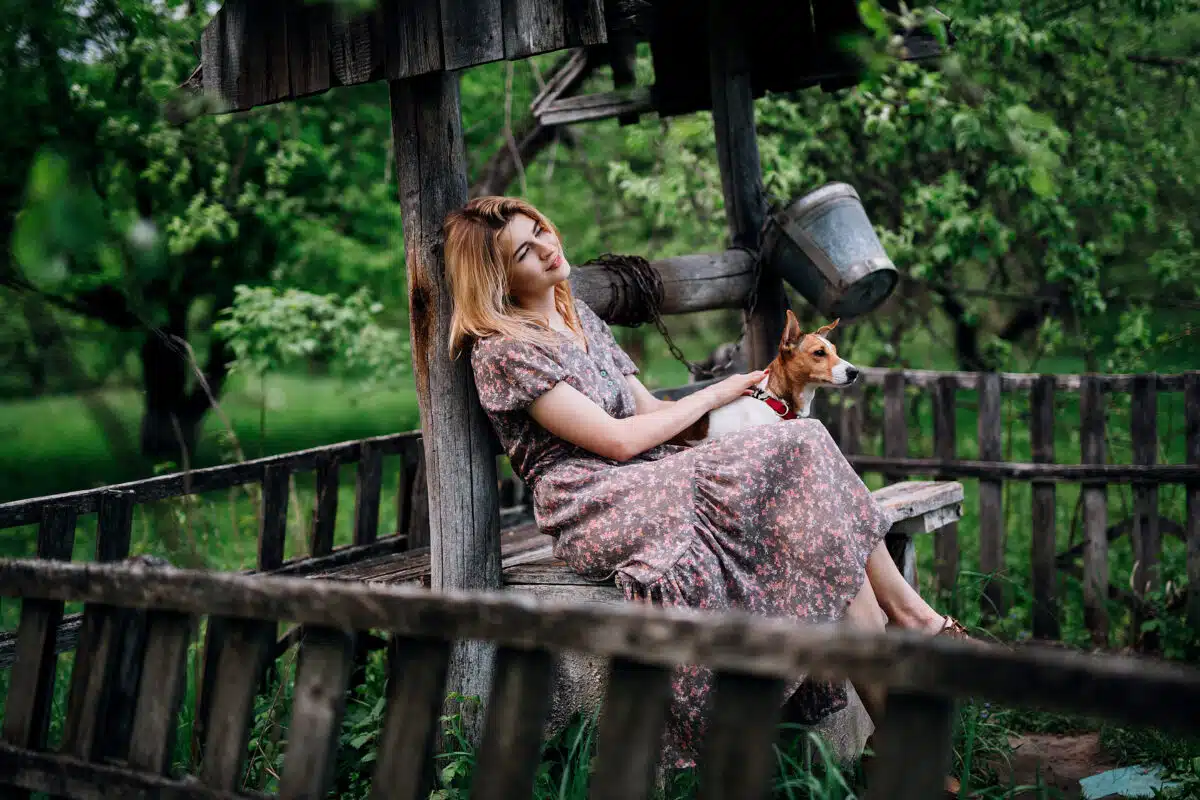
“The Village Smithy” by Körner
Shelter’d well by friendly mountains,
Wash’d by clear and cooling fountains,
In a nook so still and green,
Lovelier hamlet ne’er was seen.
Overhead, on ridges high,
Old dark pine-trees hide the sky;
Down below, the stream flows near,
And the air is mild and clear.
House and yard swarm all day long
With a busy bustling throng;
Ever as the day comes round,
Rings the anvil’s restless sound.
And the bright sparks dart and quiver,
And the steely splinters shiver,
And the flood, with thunder-sound,
Flings the ponderous mill-wheel round.
Earthly cares shall not molest,
In this vale, my peaceful breast;
Joy within my heart shall dwell,
As a pure, untroubled well.
Shaded by the whispering trees,
Will I woo the dreamy breeze;
Mountain, vale, and murmuring rill,
With deep peace my heart shall fill.
“The Motor Car” by Henry Lawson
The motor car is sullen, like a thing that should not be;
The motor car is master of Smart Society.
’Twas born of sweated genius and collared by a clown;
’Twas planned by Retribution to ride its riders down.
And straight for Caesar’s Column,
It runs to Caesar’s Column,
Last section, Caesar’s Column
To ride its riders down!
The motor car is shame-struck, for greed and misery,
For mad and hopeless self-lust, and the sins that need not be.
The motor car is vicious, for its conscience makes it so,
It aye would smash the victims while it runs the riders low.
And straight for Caesar’s Column,
Its goal is Caesar’s Column,
It longs for Caesar’s Column
To lay its riders low.
The motor car is maddened like a horse that’s had a fright,
The shameful day behind it and the Coming of the Night!
It flees across the country and it flees back to the town
And straight for Caesar’s Column to run its riders down.
And straight for Caesar’s Column,
What ho! for Caesar’s Column!
Hurrah! for Caesar’s Column!
To seal its riders down.
The motor car is reckless like a gambler losing fast;
The motor car’s in terror of the Future and the Past;
The motor car is worn out and has passed Sin’s boundary by,
And is bound for Caesar’s Column where to pile its riders high.
It’s bound for Caesar’s Column
And marked for Caesar’s Column,
And doomed for Caesar’s Column
To pile its riders high.
The motor car is brainless, and scornful of all tears,
Its dust is in our faces, its giggle in our ears,
Its harsh laugh is the last laugh of the last lost soul alone,
’Tis nearing Caesar’s Column to set self-damned in stone.
Change here for Caesar’s Column!
All out for Caesar’s Column!
Past Hope and Caesar’s Column
To lodge self-damned in stone.
I don’t know how ’twill happen, or when ’twill come to pass,
But folk shall yet pass sanely by river, tree and grass;
By homesteads and farm wagons, they’ll ride each pleasant mile,
And back from Caesar’s Column where the world went mad awhile.
And back from Caesar’s Column
With lessons from the Column;
Grown sane at Caesar’s Column
To save the world awhile.
From “The Return of the Heroes” by Walt Whitman
Toil on heroes! harvest the products!
Not alone on those warlike fields the Mother of All,
With dilated form and lambent eyes watch’d you.
Toil on heroes! toil well! handle the weapons well!
The Mother of All, yet here as ever she watches you.
Well-pleased America thou beholdest,
Over the fields of the West those crawling monsters,
The human-divine inventions, the labor-saving implements;
Beholdest moving in every direction imbued as with life the
revolving hay-rakes,
The steam-power reaping-machines and the horse-power machines
The engines, thrashers of grain and cleaners of grain, well
separating the straw, the nimble work of the patent pitchfork,
Beholdest the newer saw-mill, the southern cotton-gin, and the
rice-cleanser.
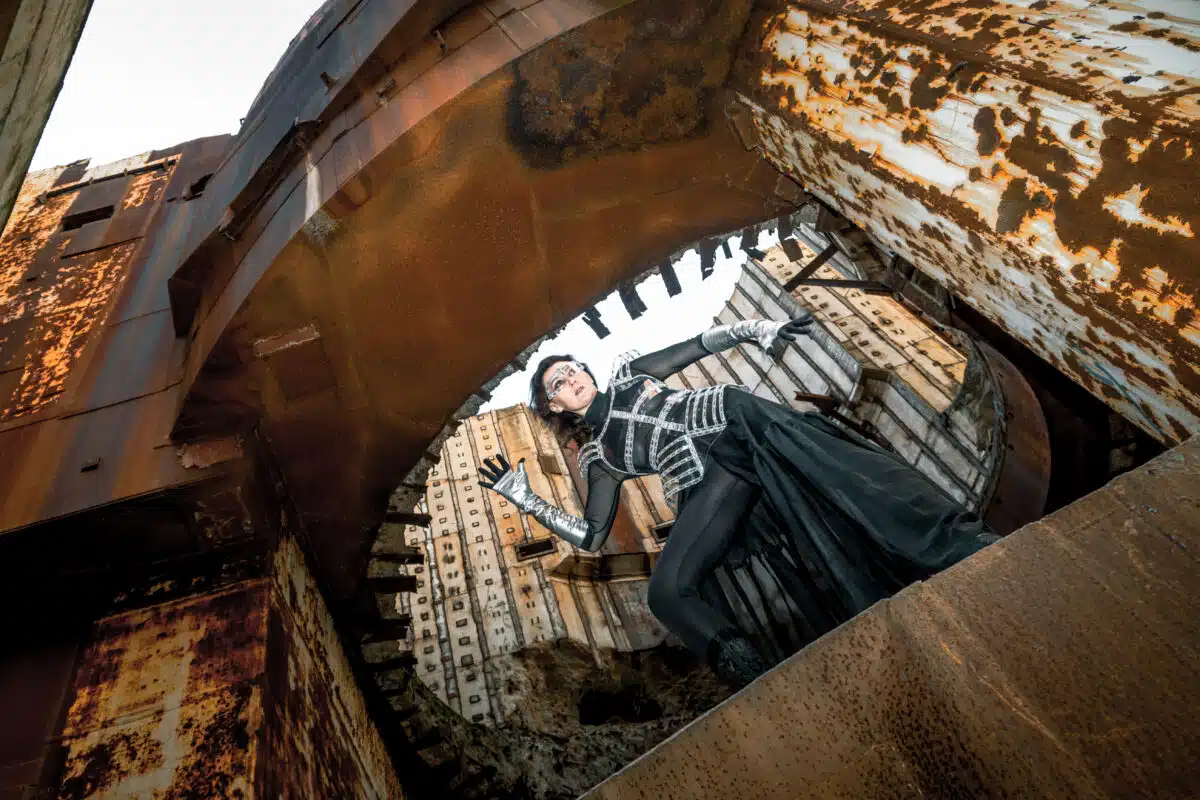
“The Steel Makers” by Leon R. Harris
Filled with the vigor such jobs demand,
Strong of muscle and steady of hand,
Before the flaming furnaces stand
The men who make the steel.
’Midst the sudden sounds of falling bars,
’Midst the clang and bang of cranes and cars,
Where the earth beneath them jerks and jars,
They work with willing zeal.
They meet each task as they meet each day,
Ready to labor and full of play;
Their faces are grimy, their hearts are gay,
There is sense in the songs they sing;
While stooped like priests at the holy mass,
In the beaming light of the lurid gas,
Their jet black shadows each other pass,
And their hammers loudly ring.
What do they see through the furnace door,
From which the dazzling white lights pour?
Ah, more than the sizzling liquid ore
They see as they gaze within!
For a band of steel engirdles the earth,
Binds men to men from their very birth,
Through all that exists of any worth
There courses a steely vein.
Steamers that ply o’er the ocean deep,
Trains which over the mountains creep,
The ships of the air that dart and leap
Where the screaming eagles soar;
The plow which produces the nation’s food,
The bars that keep the bad from the good,
Skyscrapers standing where forests stood,
They see through their furnace door.
They see the secretive submarines,
And the noisy, whirring big machines,
Grinding steel into numberless things
The people know and need;
The scissors that fashion wee babies’ clothes,
The beds where the pallid sick repose,
The knife that the nervy surgeon holds
O’er the wounds that gape and bleed.
Yet more they see through the furnace door!
They see the bursting hot shells pour
On the battle-fields as in days of yore
The Deluge waters fell.
They see the bloody bayonet blade,
The unsheathed sword and the hand grenade,
The havoc, the wreck and the ruin made
By the steel they roll and sell.
All this through the furnace door they see
As they work and laugh—they are full and free;
Their steel has purchased their liberty
From want and the tyrant’s sway.
And just as long as their gas shall burn,
In times of need will the people turn
To them for their product and they shall learn
Its value endures for aye.
For of what they make we are servants all,
They have bound our lives in an iron thrall,
We do their bidding, we heed their call,
As they work with willing zeal.
So tap your heats with a courage bold,
You’re worth to your world a thousand fold
More than the men who mine her gold,
You men who make her steel!
“Among the Crumbling Arches of Decay” by Iris Tree
Among the crumbling arches of decay
Where all around the red new buildings crept,
Where huge machines had rolled the past away,
And the dead princes lay accursed and slept;
Among the ruins I beheld a man
Who heeded not the engines as they neared,
Painting dead carnivals upon a fan,
He smiled and trifled with his pointed beard.
And here and there were flung a mess of things,
Tokens and fripperies and faded dresses,
Kept from the courtships of a thousand kings,
Tossed roses for the tossing of caresses.
A carven sabre hung upon the wall,
A toy thing, with no rust of blood upon it,
A tray of glasses, an embroidered shawl,
A muff, a bottle and a feathered bonnet.
And mirrors flashed their argent memories
Out of the shadows where they laughed and gleamed,
While ghostly faces of past vanities
Come back to dream there where they once had dreamed.
The stranger turned his head and bowed to me
And waved me vaguely to a gilded chair.
I spoke: “You are a connoisseur, I see,
You really have a fine collection there.”
He bowed to me again, and in his hand
Dangled a string of gems, they caught my eye
With beckoning lights—I could not understand—
His fingers seemed to touch them like a sigh
So much he loved their frail inconsequence.
I spoke of progress conquering decay,
And tired the stillness with my common sense
Loud-spoken in the jargon of the day.
But I have never met so queer a man,
“I better love my memories,” he said,
“Look at those painted figures on the fan,
How delicate and wistful are the dead.”
From “The Twelve-Forty-Five” by Joyce Kilmer
Within the Jersey City shed
The engine coughs and shakes its head,
The smoke, a plume of red and white,
Waves madly in the face of night.
And now the grave incurious stars
Gleam on the groaning hurrying cars.
Against the kind and awful reign
Of darkness, this our angry train,
A noisy little rebel, pouts
Its brief defiance, flames and shouts —
And passes on, and leaves no trace.
For darkness holds its ancient place,
Serene and absolute, the king
Unchanged, of every living thing.
The houses lie obscure and still
In Rutherford and Carlton Hill.
Our lamps intensify the dark
Of slumbering Passaic Park.
And quiet holds the weary feet
That daily tramp through Prospect Street.
What though we clang and clank and roar
Through all Passaic’s streets? No door
Will open, not an eye will see
Who this loud vagabond may be.
Upon my crimson cushioned seat,
In manufactured light and heat,
I feel unnatural and mean.
Outside the towns are cool and clean;
Curtained awhile from sound and sight
They take God’s gracious gift of night.
The stars are watchful over them.
On Clifton as on Bethlehem
The angels, leaning down the sky,
Shed peace and gentle dreams. And I —
I ride, I blasphemously ride
Through all the silent countryside.
The engine’s shriek, the headlight’s glare,
Pollute the still nocturnal air.
